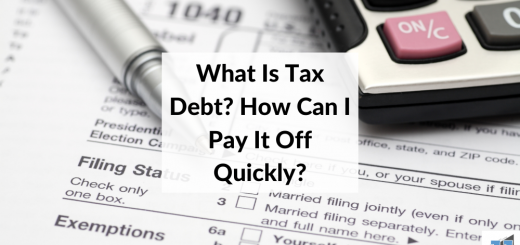How to Pay Off Medical Debt Quickly
If a medical emergency happens, life can feel overwhelming. Unfortunately, the stress doesn’t end once you recover. Once the medical bills start pouring in, it can be hard to figure out exactly what you should do.
When figuring out how to pay off medical debt, it’s important to start by determining if you can reduce your total amount owed. Then, work on developing and implementing a payoff plan.
What Is Medical Debt?
Medical debt occurs when an individual has unpaid medical bills. The longer they are unpaid, the more that interest and fees will increase the total amount owed. Sometimes these bills may even be sold to collections agencies.
Medical debt is different from other types of debt because it typically isn’t the result of choosing to make an expensive purchase. Most people don’t plan on having a pricey medical emergency.
Add to that the confusing nature of medical insurance, non-covered procedures and medical expenses can happen to anyone.
How to Reduce Your Medical Debt
As you start your medical debt repayment journey, you can take steps to try to reduce the total amount you owe. Here are a few strategies to use to reduce your medical debt repayment total.
Review The Accuracy of Your Medical Bills
Before you pull out a credit card or debit card to pay your medical bills, make sure to review the details associated with what you owe.
Many medical procedures involve multiple specialists with separate billing departments (think exam, labs, etc.). This means you may receive more than one bill for a medical visit. Verify the accuracy of all paperwork you receive prior to making any payments.
There are two specific things you need to review during this process, including the itemized bill and the explanation of benefits.
Itemized Bill
Most medical bills will itemize each charged item for your visit. This may include exam fees, procedure fees, and charges for any items used. Make sure you review every line to ensure the charges look accurate.
If there are any errors on your bills, contact the medical office’s billing department to ensure they are corrected.
Explanation of Benefits
In addition to your bill, you will also receive an Explanation of Benefits (EOB) from your health insurance provider. This looks similar to the bill, but it gives you the details of what your insurance will cover and what is your responsibility.
Compare the details of your EOB with the bill from the medical office to ensure they line up. If you believe that your insurance should be covering more of the costs, make sure to contact them and have them review your coverage for the bills you are receiving.
Also, if the medical office coded any part of the procedure incorrectly, your insurance may not cover the costs properly. Review your medical bill and have the medical office correct any errors to ensure your insurance correctly covers your bills.
Apply For Medical Debt Forgiveness
For many people, medical bills are far too expensive to pay them off on time. Here are a couple of ways to get help with your medical bills if you can’t afford to pay them.
Ask the Hospital or Medical Office About Financial Aid Programs
The Affordable Care Act added a policy that non-profit hospitals and medical centers are required to have financial assistance programs. If you are underinsured and your income is at or below the Federal Poverty Level (FPL), you may qualify for free or reduced-cost medical treatment.
All states offer different levels of assistance. Ask the medical center what their financial assistance programs are to help you reduce or eliminate your medical bills if you meet their criteria.
Learn About State Medicaid Options
Medicaid is offered to individuals and families who qualify based on their income. This includes low-income families, qualified pregnant women and children, and individuals receiving Supplemental Security Income (SSI).
Medicaid can help reduce or eliminate the cost of your medical care. It may even cover a medical bill up to 90 days after the procedure has taken place.
To see if you qualify, go to Medicaid.gov to learn about their eligibility criteria.
Negotiate Your Medical Bills
Whether you have one large bill or a stack of smaller bills, you don’t necessarily have to pay the total amount listed. Most hospitals and medical offices have room to negotiate your bill, so it never hurts to ask.
Here are a few ways to negotiate a lower payment on your medical bills.
Compare Costs With Healthcare Bluebook
Healthcare Bluebook helps you compare the costs of your procedure with what other nearby medical facilities charge. This can help you confidently ask for a discount if your bill is higher than average.
Ask for a Lump-Sum Payment Discount
Many hospitals will extend a discount for patients who can pay off their bills quickly. Asking for a discount to pay off the bill in a lump-sum could net you a 10% to 25% discount (or more).
If you have the cash to do it, don’t be afraid to ask for a large discount and see what they can do.
Tell Them What You Can Afford
Hospitals understand that many of their patients cannot afford the medical care they are receiving. When negotiating your bill, be transparent about what you can afford and what you can’t.
Providing them with an amount you can pay is better than ignoring them and having them send the bill to collections. In the end, paying something on your bill is better for the hospital than paying nothing at all.
How To Pay Off Medical Debt
If you don’t qualify for full medical debt forgiveness, it’s time to put together your own payoff plan. This might feel impossible at first, but here are a few tips to help you pay off your medical debt quickly.
1. Put Together a Budget
To know how much money you have to pay down your medical debt, you need to know what you are making and spending every month. Putting together a monthly budget will give you a plan for your money and allow you to set aside cash each month toward your medical debt.
If you need help putting together a budget, check out our YNAB review for more details about our favorite budgeting app.
2. Set Up a Payment Plan
If you can commit to a regular monthly payment, many medical providers will work with you to set up an interest-free payment plan. This will help you pay off your medical debt over time without accruing any additional charges.
As with any agreement, get it in writing before making payments.
3. Use The Debt Snowball
Having a stack of medical bills is stressful. However, if you organize them in order of balance from smallest to largest, you will have a clear path forward to paying them off.
Just make sure the bills you are putting off until later get some type of minimum payment. Otherwise, they may accrue extra fees.
If you want to organize your medical bills automatically, the Undebt.it Debt Snowball tool does this for you. Simply input your bill names, totals, and interest rates (if any), and the tool will organize them in order from smallest to largest.
It will also show you exactly when these bills will be paid off and when you will become free from medical debt once and for all!
Related: What Is The Debt Snowball?
How To Deal With Collections Agencies
In the event you are delinquent on your medical bills and they have been sold to a collection agency, you must know your rights. Simply paying them without getting the proper documentation may hurt you in the long run.
Hospital collections agencies are typically easier to work with than debt collectors, but they may still charge exorbitant interest and fees on your bills.
Here are a few things you can do to get these bills paid:
- Ask for an itemized bill
- Negotiate a lower payoff price
- Get an agreement in writing before paying
- Offer to pay something (if not the full amount)
If you get the details of the itemized bill and can come to a verbal agreement, make sure you get that in writing from the agency before you pay them. Once you pay them, keep this agreement in your records so they cannot try to collect on the bill again.
If you don’t have the full amount, come up with a payment agreement (again, in writing) and offer to pay something. This will keep them from reporting you to the credit bureaus and allow you to start paying off your debt.
Summary
Paying off medical debt doesn’t have to take forever. There are many ways to help lower your costs and break down large bills into bite-sized chunks. Don’t wait until the debt collectors start calling to make a plan.
Undebt.it exists to help you stop stressing about debt and start taking action. Check out our tools by signing up for a free account and plugging in your numbers. You may be surprised how quickly you can become debt-free!



